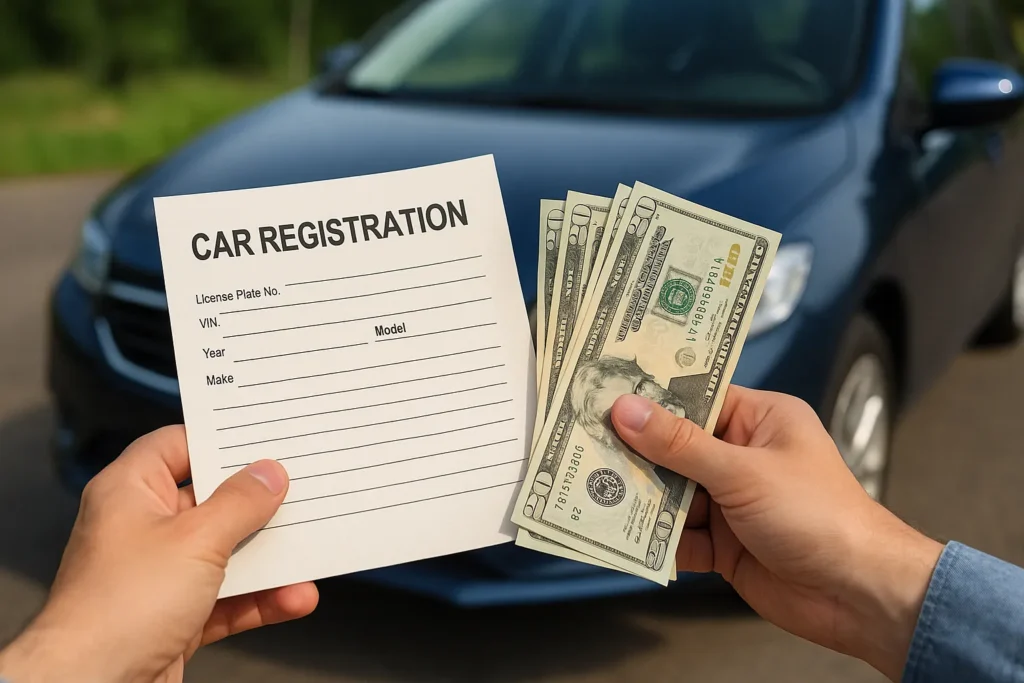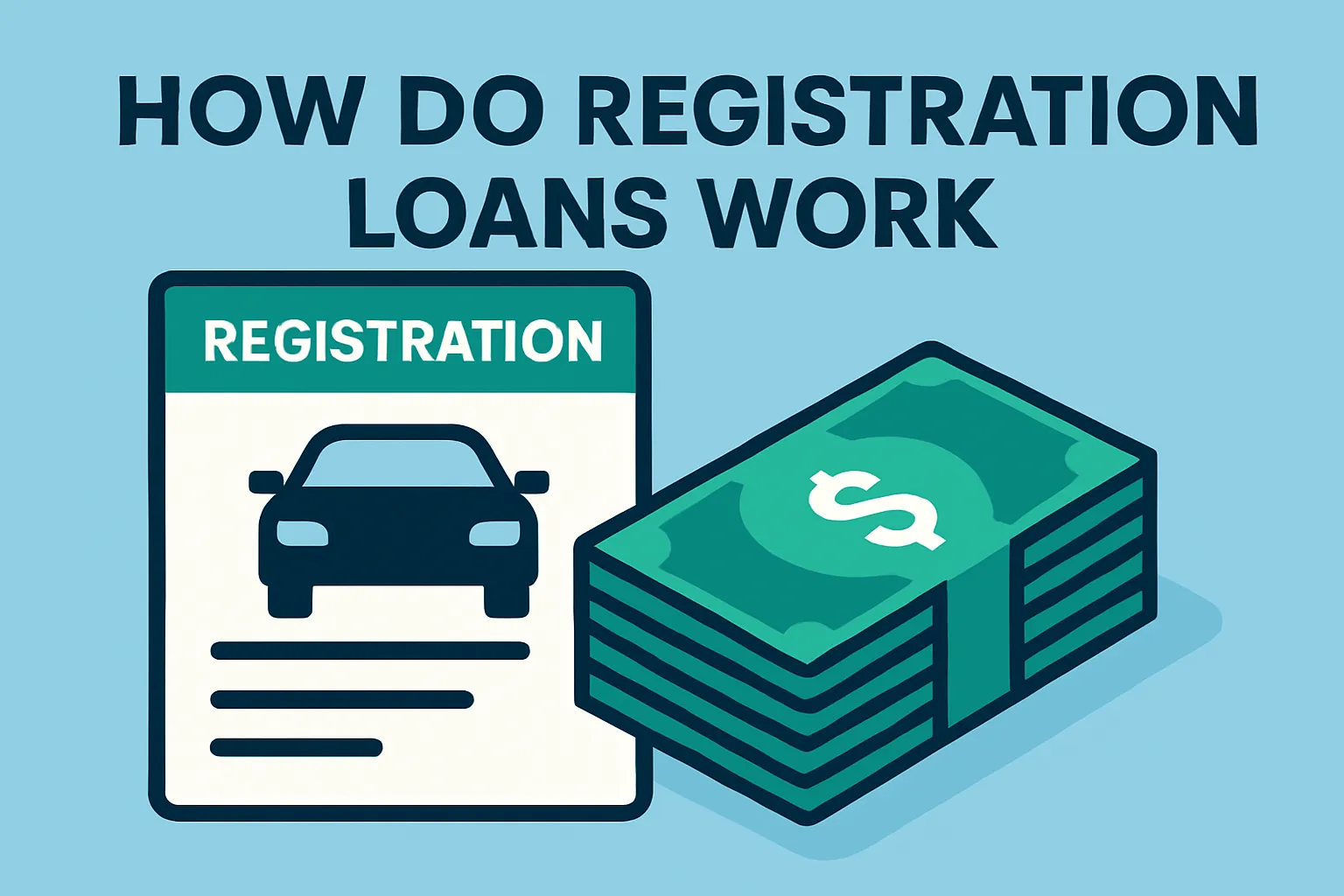When an unexpected car repair, medical bill, or string of unexpected expenses hits, it’s natural to look for fast cash that lands in your bank account within a single business day. Two products dominate the “cash-from-your-car” space: registration loans and auto title loans. They sound similar, yet the key differences can seriously affect your wallet, your credit, and your ability to keep driving.
Below you’ll find a deep dive answering the question “how do registration loans work?”, which states allow them, the complete approval process, and the red flags to watch out for so you don’t trade one emergency for another.
Key Takeaways
- A registration loan is a secured loan that uses the vehicle’s registration (not the paid-off title) as collateral, making it attractive for drivers who are still financing their cars.
- Availability is limited. While the product began in the state of Arizona, versions now exist in a handful of other states that regulate small-dollar vehicle lending. Always verify local rules.
- The entire application process can be handled through a short online form. Expect a soft credit check, income verification, and same-day or next-day funding once you receive final approval.
- Because lenders cater to borrowers with bad credit, high interest rates and steep fees are the norm.
- Safer alternatives—such as credit-union personal loans, short-term installment loans, or 0 % introductory-APR credit cards—often cost far less.

How Do Registration Loans Work?
A registration loan leverages the paper that proves you legally registered your vehicle with the state. Instead of handing over a clear vehicle title, you pledge the vehicle’s registration as collateral. Here’s why that matters:
| Factor | Registration Loan | Car Title Loan |
|---|---|---|
| Collateral | Registration only | Clear vehicle title |
| Vehicle inspection | Usually not required | Frequently required |
| Loan size | Lower minimum loan amounts and caps tied to wages, vehicle mileage, and vehicle’s value | Up to 50 % of the car’s resale value |
| Interest | Still high interest rates, but often lower than a traditional title loan | Highest of the two |
| Who qualifies | Borrowers with loans still outstanding on their cars | Borrowers who own the car outright or hold significant equity |
| Physical custody | You keep the keys and continue driving | Same, but lender holds the paper title |
Because the lender doesn’t need your title, it can approve customers who haven’t paid off their cars yet—so long as the lienholder (the original auto lender) agrees in writing or the state permits a “junior” lien on a registration. That added flexibility is the main selling point.
Where Are Vehicle Registration Loans Available?
You’ll often hear that registration loans are “only an Arizona thing.” True, Arizona jump-started the product after banning payday loans in 2010, but other states—including New Mexico, Utah, parts of South Dakota, and select Native-American jurisdictions—have since adopted comparable statutes.
Because these laws change frequently, start by checking your state attorney general’s site or the Consumer Financial Protection Bureau’s state map for current compliance requirements. The federal law that governs truth-in-lending applies everywhere, so lenders must disclose the Annual Percentage Rate (APR), repayment schedule, and total loan proceeds before you sign.
Step-by-Step Approval Process
- First step – Online inquiry
- Complete an online form supplying name, date of birth, address, phone, and vehicle details (VIN, make, model, mileage).
- Select desired loan term (often 30 days to 6 months).
- Document upload
- Driver’s license or state ID
- Current vehicle registration in your name
- Proof of full-coverage insurance (varies by lender)
- Two recent pay stubs or bank statements as proof of income
- Utility bill or lease to prove residency
- Conditional approval
- Lender pulls a soft credit history report. Even with bad credit, you may qualify because the loan is secured.
- A preliminary offer lists competitive interest rates, fees, and estimated monthly or flexible repayment plans.
- Vehicle evaluation
- Some lenders request photos to confirm condition and vehicle evaluation data; others rely on third-party valuation guides.
- Final approval & funding
- Sign e-documents, agree to automated direct deposit withdrawals, and receive funds—sometimes within a business day.
Throughout, you’ll see terms like “guaranteed offer,” “no-inspection quick cash,” or “same-day emergency cash.” Don’t confuse slick marketing with automatic approval. Skip any lender that refuses to run affordability checks or glosses over the cost of missed payments.
How Lenders Set Actual Loan Amounts & Pricing
- Vehicle’s value – Determined via Kelley Blue Book, Black Book, or internal guides.
- Income & debt-to-income ratio – Confirms whether your budget can handle set monthly payments.
- Credit score – Influences rate tiers. Borrowers with good credit snag lower APRs; higher interest rates kick in as scores drop.
- State caps – Many jurisdictions impose statutory maximums on both the dollar amount and APR.
The resulting APR often lands between 60 % and 175 %. That sounds steep—and it is—but still may undercut a rollover payday loan that can exceed 400 % APR, according to Consumer Federation of America research.
Comparing Alternatives
| Type of Loan | Speed | Cost | Collateral | Best for |
|---|---|---|---|---|
| Registration loan | Same day | High | Registration | Still-financed vehicles |
| Auto title loan | Same day | Very high | Clear title | Larger loan needs |
| Personal loan (credit union) | 1-3 days | Low-to-medium | None | Good-credit borrowers |
| Short-term installment loan | Same day | Medium | None | Mixed credit |
| 0 % intro-APR credit card | Instant approval | Low if paid before promo ends | None | Excellent credit |
| Buy now, pay later plans | Instant | Low-to-medium | Item purchased | Small purchases |
A personal loan through a credit union or community bank routinely beats the APR on any registration loan. Even if you only qualify for a small loan, the savings compound quickly.
Pros & Cons at a Glance
Pros
- Keeps you driving—no surrender of the vehicle title.
- Lower entry barrier than a bank loan; credit check is secondary.
- Faster than waiting for a traditional loan application to churn through underwriting.
Cons
- High interest rates can double the amount you repay on a 6-month schedule.
- Missed payments wreck your credit score and invite repossession.
- Extra fees—lien recording, late fees, “**first step **” processing charges—inflate your cost beyond headline competitive rates.
- Not available nationwide; you must reside in a permitting state.
Staying Safe & Compliant
Because registration lenders must meet federal “Know Your Customer” (KYC) and anti-money-laundering rules designed to thwart the funding of terrorism, expect requests for:
- SSN for identity verification
- Confirmation that the credit card or debit account you list is actually yours
- Agreement that the lender may pull credit periodically to monitor risk
Refuse any lender that:
- Promises loan approval with “No Job? No Problem!” slogans
- Asks for a blank vehicle title “just in case”
- Ignores state mandated maximums on minimum loan amounts, APR, or fees
- Won’t supply a Truth-in-Lending Act disclosure form—required under federal law
For a government primer on auto-secured loans, review the FTC’s guidance on title and registration lending.
Repayment Strategies—Avoiding the Debt Spiral
- Automate payments – Align the due date with payday to cut late-fee risk.
- Round up – Pay $25 to $50 extra to shrink principal faster.
- Request a payoff quote – By law, lenders must supply an up-to-date payoff figure within a reasonable time frame.
- Refinance – If your credit improves, shift to a lower-rate installment loan or credit-union auto loan.
- Snowball method – Knock out the smallest balance first if juggling multiple debts; motivation helps momentum.
Frequently Asked Questions
Is a registration loan the same as a title loan?
No. The former secures your vehicle’s registration, while the latter seizes your car title until the balance is cleared.
What documents do I need for the registration loan application process?
A valid ID, proof of residence, active bank account, vehicle registration, insurance, and recent proof of income.
How fast can I get my money?
With a completed file, some lenders fund via ACH direct deposit in less than one business day.
Can I keep driving my car?
Yes. You retain possession so long as you meet loan payments and insurance remains active.
What happens if I default on a registration loan?
The lender can repossess, sell the car, and use the loan proceeds to settle the balance plus recovery fees.
Are there safer alternatives?
Absolutely—credit-union personal loans, short-term installment loans, paycheck advances from employers, or local assistance programs can all cover a financial situation without triple-digit APRs.
Bottom Line—Choosing the Best Option
A registration loan can bridge a genuine emergency, especially when traditional lenders reject you for bad credit. Yet the convenience comes at a steep price. Before pledging your registration:
- Compare total repayment against at least two alternatives.
- Verify that the lender is licensed in your state.
- Read every disclosure—particularly the APR, fees, and loan term.
- Plan to repay early and avoid rolling the balance into a new contract.
By approaching any secured loan with eyes wide open, you preserve both your vehicle and your financial future—transforming a potential debt trap into a one-time tool that covers financial needs without derailing long-term goals.
Disclaimer: This post is for educational purposes only and is not financial, legal, or tax advice. Do your own research or consult a qualified professional before making any decisions.
Affiliate Disclosure: GetJoeMoneyRight.com is a participant in the Amazon Services LLC Associates Program, an affiliate advertising program designed to provide a means for sites to earn advertising fees by advertising and linking to Amazon.com and affiliated sites.

